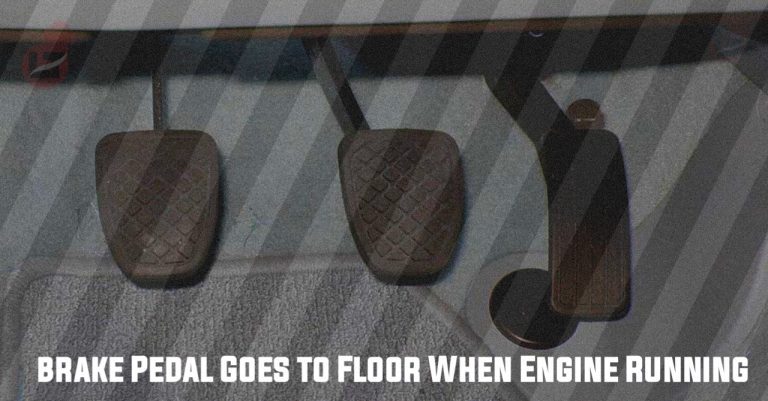Have you ever been in a situation where your brake pedal goes to the floor when the engine is running? Probably yes, and we can all attest it isn’t a funny situation.
A break pad on the floor while driving isn’t only dangerous to the driver but also disastrous for other road users, especially when driving at a very high speed.
The scenario is equivalent to driving a car without a functional break which isn’t advisable as you could lose control and crash into objects in front.
The possible ways to fix this issue are by checking your brake fluid Level or getting a new brake cylinder.
Notwithstanding, you must also take your car to a mechanic. If you notice that your brakes aren’t effective as they used to be before, it gets damaged, thereby leaving them on the ground.
In this article, you’ll learn what fixes to use if your brake pedal goes to the floor when the engine is running.
Why does Brake Pedal Go to the Floor when the engine Running?
Firstly, The primary reason why your brake Pedal Goes to the floor is due to Insufficient or drained brake fluid, which helps to maintain the brake power.
When the driver engages the pedal, the brake pedal compresses the piston in the braking cylinder to release fluids into the brake caliper due to the pressure exerted on the brake lines.
The Bread pads on its end; slide and produce a high pitch sound as it touches the braking rotor due to the high pressure of the brake fluid. So, insufficient or drained brake oil won’t be able to exert the required pressure, making your pedal fall to the floor.
Secondly, a faulty brake pad cylinder could be responsible for your brake pedal falling to the ground.
The brake pedal is connected to the master cylinder with a push rod whose primary function is to provide a solid feel when you compress the pedals. Seals guard the master cylinder, supplying brake fluids to the four corners of the wheel while producing hydraulic pressure to engage the brakes.
Therefore, if any damage to the seals guarding the master cylinder is broken, it’ll lead to internal leakage, thereby causing the brakes to have no effect.
Thirdly, a damaged brake booster may be why the brake pedal goes to the floor without affecting the vehicle. As the name implies, the brake booster helps provide power assistance during the braking process.
This makes it easier for the car to stop without applying much pressure on the brakes; the brake booster is mainly located between the master cylinder and brake pedal.
Finally, getting a master cylinder replacement might alter the functionality of the brake pedal. This problem mainly arises if there are mistakes like air in the brake lines during installation.
Air isn’t supposed to be present in brake lines because it makes the brake feel spongy rather than the strong feeling it was supposed to give, thereby restricting the efficient flow of brake fluids.
3 Ways to Fix Brake Pedal Goes to Floor When Engine Running
It’s e always to confirm all the components of your vehicle are working correctly before hitting the road to avoid being shocked to see that your brake pedal is on the floor when the engine is running.
Nevertheless, the issue is minor and can be fixed instantly if you know a car brake system.
You can start by troubleshooting the above three components to get your brake pedal firm once again.
1. Check the Brake Fluid Level
The first thing to do is to check the level of your brake fluid (it should be complete) and top it up if necessary. However, if the brake fluid level keeps dropping constantly, then proceed to check for leakages.
2. Check for Brake Fluid leakage
The first thing that comes to mind is to confirm if there’s a leakage in the brake lines that help deliver pressure to the brake system.
You can check for holes or cracks on any of the 4 wheels, then proceed to replace the faulty parts.
3. Inspect the Brake Master Cylinder
The brake master cylinder should be checked next because it has seals to close the oil inside. As mentioned in the preceding section, these seals may deteriorate with time due to the car’s age, leading to brake fluid leaks. In this situation, a new master cylinder ought to be installed.
It’s rIt’smended that you install a brand-new brake master cylinder and not a rebuilt or fairly used one because the lifespan of a used cylinder is short. It could perform well at first but deteriorate over time.
What Causes a Hard Brake Pedal?
A hard brake pedal always indicates an issue with the brake booster. By applying pressure to the brake master cylinder, the brake booster uses vacuum air from the engine to help push the brake pedal.
Summarizing
A brake pedal going to the ground when a car engine is running is very risky, especially when it happens in a case of emergency because the inevitable outcome is a deadly accident.
However, it’s advisable to take your vehicle to a mechanic if your brake pedal isn’t firm as It used to be.
In addition, endeavor to top up or change the brake fluid at selected intervals to maintain the viscosity.
As an Amazon Service LLC Program Associate, V. Auto Basics earns from qualifying purchases. See Our Affiliate disclaimer.
